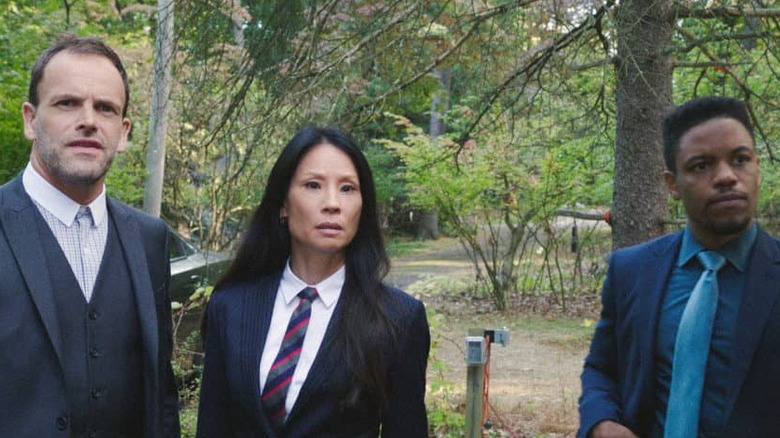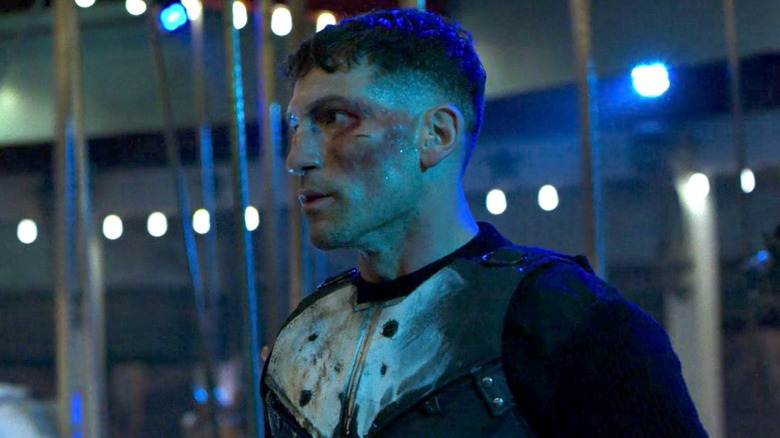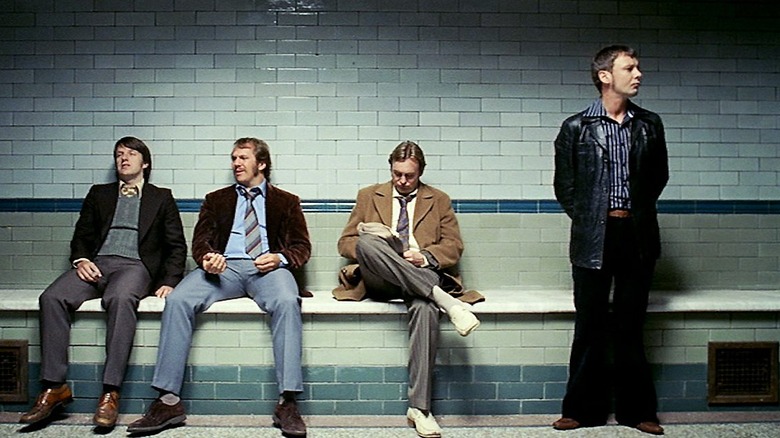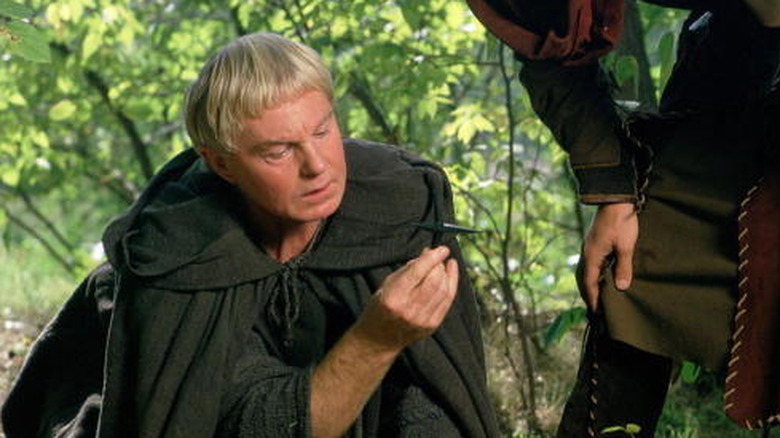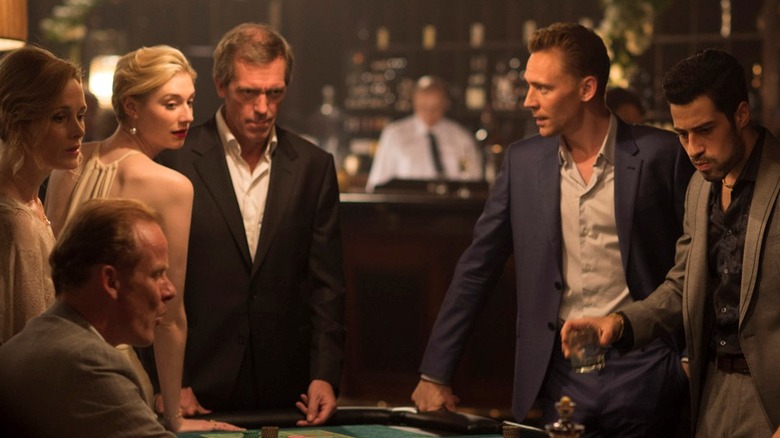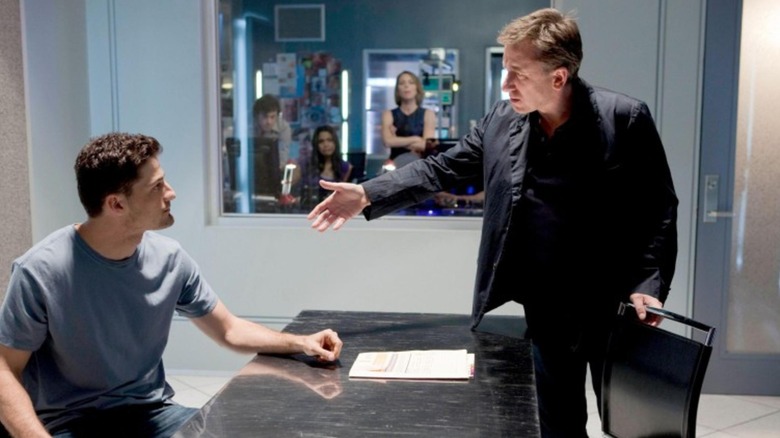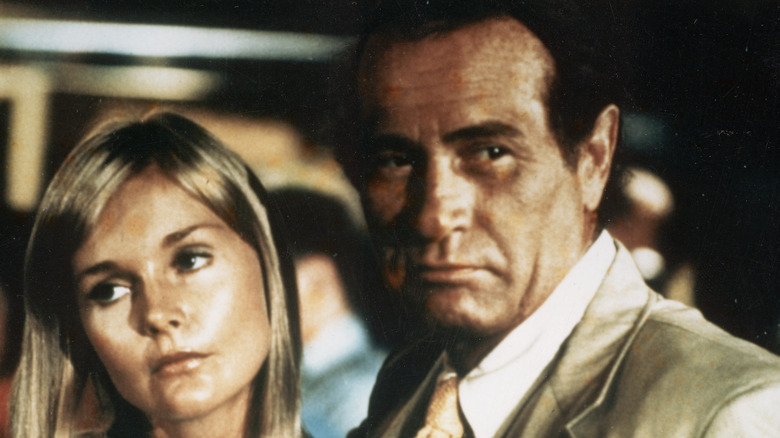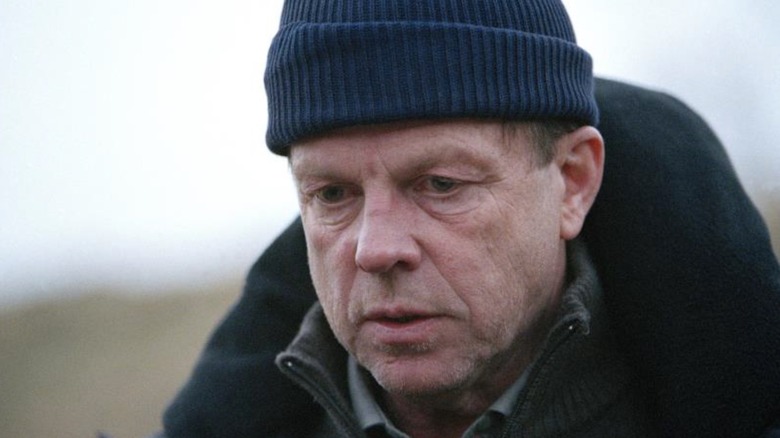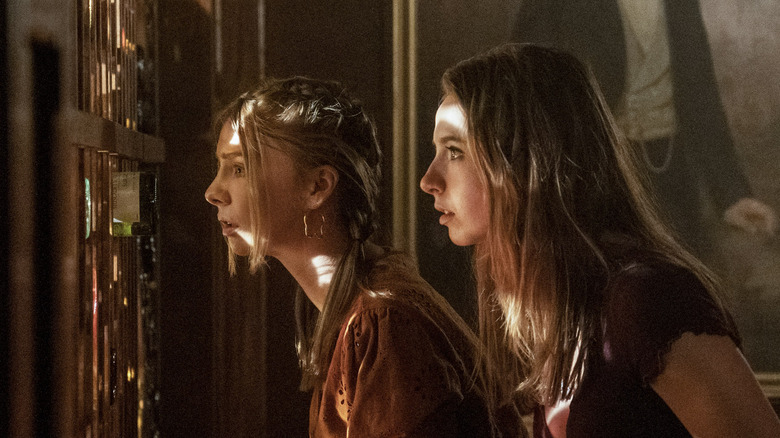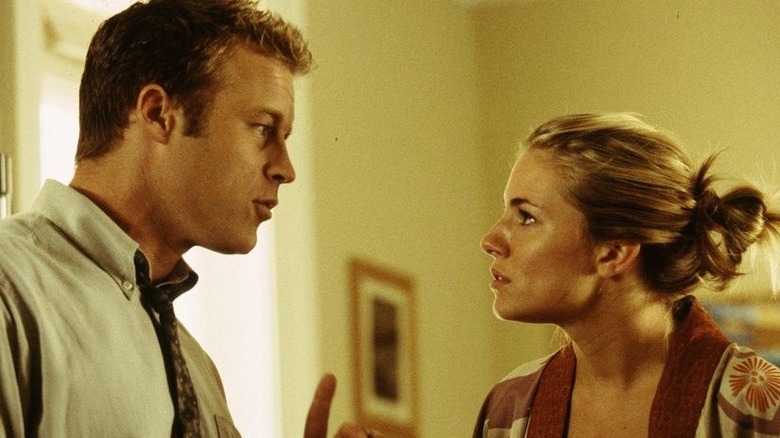Underrated Crime Shows You Need To Watch
Crime shows, detective shows, police procedurals, murder mysteries ... the crime genre is all over TV, and it's one of the most popular types of series around. We love to watch the brilliant sleuth bring the wicked criminal to justice; we exult when our solution to the mystery matches the outcome onscreen; our brains get fed when we follow the tiny tidbits of evidence the TV investigator collects. Some crime series are some of the longest-running shows of any genre: the many "Law & Order" shows are just one example.
Maybe because of this widespread popularity and myriad choices within the crime genre, sometimes a perfectly good show will go unnoticed, fall through the cracks, be unfairly compared to more popular shows, or in general be underrated.
Here, we reveal to you a bunch of these underrated crime shows that you may have missed and definitely should watch. Within this collection, we've included shows that are underrated critically and/or popularity-wise, as well as others that were underrated compared to other shows that were on at the time. These are in no particular order, and no particular time period when it comes to viewership. If you need a new (to you) show to binge, any of these underrated crime shows would be a great choice.
Warning: Some spoilers for each of the following shows ahead!
Elementary (2012-2019)
"Elementary" more or less fell by the wayside in the shadow of "Sherlock," and was panned by some critics at the time for being a knockoff or copycat of the more popular series, but those comparisons might be slightly unfair.
"Elementary" takes place in contemporary times (just like "Sherlock"), which was one of the main reasons some viewers dismissed it during its broadcast run. The fact that it takes place in New York City instead of London was seen as a gimmick, as was the casting of Lucy Liu as Dr. Watson. As a result, even though it has a good seven seasons to binge, this is one Sherlock Holmes adaptation that many crime fans missed. You don't have to be a Holmes nerd to get into this show, though — it's a dynamite police procedural in its own right, with entertaining villain-of-the-week storylines as well as some longer, compelling, multi-part arcs. For Sherlock Holmes enthusiasts, it's also chock full of Easter eggs from the original canon.
Further working in its favor: It's rare to find a strong, deep, male-female relationship that stays purely platonic. And it's also worth noting that "Elementary" doesn't descend into convoluted plotlines and off-the-rails character changes in its later seasons.
Happy! (2017-2019)
The crime shows that are most often associated with actor Christopher Meloni are no doubt either of the "Law & Order" spinoffs that he's starred in, but there's one genre entry on his resume that was so brief, so unusual, and so unlike anything he's done in the "L&O" universe that you more than likely missed it. Which is really too bad, because it's pretty great in its own right.
The premise of "Happy!" surrounds an alcoholic ex-cop turned hitman investigating the kidnapping of his estranged daughter. The investigation begins (and the show gets weirder) when our protagonist wakes up from a heart attack to a little blue cartoon unicorn named Happy, who's his daughter's imaginary friend — she's sent him to find her dad and help him come rescue her. Though the show enjoyed mid- to high critical acclaim during its time on the air, "Happy!" was underrated in terms of mainstream viewership, mostly because of how surreal, dark, and messed up it can get. Meloni has talked about how exciting it was to work on this show, too — it's an actor's dream to be given the opportunity to throw so many wild and weird curveballs.
All in all, "Happy!" is a brain-melting good time, and also really unlike any other crime show out there. If you missed it when it aired, it's only two seasons long, so it's relatively easy to binge (though perhaps a bit dark for too many episodes in a row).
The Punisher (2017-2019)
This dark, gritty, anti-hero centered series is one drop in the ever-larger Marvel Cinematic Universe franchise bucket, although it's only barely above average in terms of its Rotten Tomatoes ratings and isn't really talked about or included in most discussions of any of the other Marvel components. "Daredevil," the similarly gritty series from which "Punisher" spun off, tends to be in the Marvel conversation much more often than 'The Punisher."
Like so many other films and series in the MCU, "The Punisher" is based on the comics, and to its credit, it serves as a mostly faithful adaptation of one of the darkest superheroes to enact revenge in the nighttime city streets since Batman got grimdark. It's a refreshing departure from the generally cheery tone in much of the rest of the MCU, and it's elevated further by star Jon Bernthal, who can be seen doing some of his best questionable-hero-goes-bad-guy work since "The Walking Dead." In the end, the reasons this series is underrated compared to other superhero fare are the same qualities that make it a great show for crime fans: the good guy isn't super good, it's graphically violent (and features some really good stunt work), and the revenge plot gets pretty dark.
All in all, this neglected runt of the blockbuster MCU superhero litter is well worth a watch.
Life on Mars (British version) (2006-2007)
Any IMDb search for "Life on Mars" will show a plummeting popularity rating, and more about the much shorter-lived American version of the British original. The American version was canceled midway through its first season, leaving showrunners in the unenviable position of being forced to scramble to get to the resolution of the series plot too quickly. The British original, on the other hand, was afforded two well-balanced seasons to explore its themes, pull out all the threads of each plot, and work its way to a satisfying conclusion.
"Life on Mars" is an inventive spin on what would otherwise be a standard police procedural — a detective gets hit by a car and wakes up to find himself transported to the year 1973. Or is he actually in a coma back at home in 2006? It's a creative show with plenty of dramatic tension, stemming from the crime aspect of the premise as well as the time-travel thread working its way through each episode. The mystery-a-week format is interestingly juxtaposed with discussion of the social and technological differences between how law enforcement functioned in 1973 as opposed to 2006, and the suspense of whether our main character will ever find his way back home to the present is knuckle-biting all the way to the end.
Cadfael (1994-1998)
The "Masterpiece Mystery!" umbrella series on PBS has long served as a reliable way for many crime show fans in the US to get some of the best UK period dramas and mysteries. Especially in the '90s, "Mystery!" was the host of such crime drama greats as the Jeremy Brett Sherlock Holmes series and the earlier wildly popular Miss Marple and Hercule Poirot shows, among many others. Being surrounded by so many fan favorites is one reason "Cadfael" fell through the cracks when it aired, but if you missed out on it in the midst of all the other "Mystery!" series that got more attention, now's the time to catch it.
It's not unusual to find a crime series set in the past, but it's rare that we see one that takes place all the way back in the medieval era. Brother Cadfael is a former crusader, now a monk who only wants to tend to his garden in peace, but finds his calm solitude disturbed by murder. Brilliant RSC Shakespeare veteran Derek Jacobi plays the central monk-turned-sleuth, and he brings all his acting chops to bear on the role. Employing the familiar mystery formula of more widely watched series like "Murder, She Wrote," "Cadfael" centers on an unassuming character who's often the only one sharp enough to solve the mysteries unraveling in the show's countryside setting. It's some of the best written, best acted comfort viewing you've ever missed in the crime genre.
The Night Manager (2016)
This miniseries features a stellar cast working in service of a story based on a taut thriller by John Le Carre, master of the thriller genre. Unfortunately, it fell under the radar when it first came out — many viewers simply missed it. But there was also a good amount of criticism about its execution, too. Though beautifully shot, many who did see it lamented that the incredible cast wasn't utilized to their full potential. Others complained about the writing/directing, that it didn't live up to the level of the acting potential. New York Times reviewer Emily Nussbaum called it "elegant, but ultimately empty."
If you don't mind the Le Carre thriller formula, this is a well-acted, beautifully shot romp. It's also a miniseries, so it's easy to get through, and almost feels more like watching a movie than following a TV series. The crime thriller plot can feel a bit prescribed, but this cast more than makes up for it, and you can tell they're having a lot of fun.
Lie to Me (2009-2011)
"Lie to Me" is another crime series that follows the Sherlock Holmes pattern, centering on an eccentric and independent yet brilliant investigator who helps (or leads) the official police force. His amazing powers of observation and high level of analytical brain power always save the day. This is what makes Tim Roth's Cal Lightman character so entertaining: The micro-expression science dramatized in the show was based on studies done by Paul Ekman, who actually kept a blog during the show's initial broadcast, defining the real science while showing how they had to change it for dramatic effect.
You'd think that with Tim Roth's popularity and the massive appeal of the Holmes pattern, "Lie to Me" would be as intensely popular as it was critically acclaimed. Not so: some critics panned it as a knockoff of knockoffs. Others compared it unfavorably to another eccentric-in-the-middle show, "The Mentalist," which was already wildly popular at the time. Still others complained that the way the science is treated in these plots isn't plausible.
"Lie to Me" does hold up, and is just as fun as any "House," Holmes, or "Mentalist." It does rely on Roth carrying much of the proceedings, but he does so spectacularly, and his charisma shines through in every episode. The series touches on several hot button topics of the time and treats the body language science with honor as well as theatricality.
Kolchak: the Night Stalker (1974-1975)
This short-lived crime show briefly illuminated the TV scene in the mid-'70s, but if it didn't latch on with audiences at the time, it's a hoot to watch, even today. The premise of "Kolchak: the Night Stalker" centers on a Chicago reporter who repeatedly gets caught up in homicide investigations, all of which he inevitably solves, or helps to solve. The catch? All of these murders and mysteries are caused by supernatural forces. Vampires, werewolves, even zombies and other monsters from myth, all show up to be spotted and foiled by Kolchak. An endearing bit about this premise is Kolchak's newspaper editor never believes his wild stories of magical mayhem, but writes it all off as his reporter's over-active imagination.
Mystery-of-the-week format, with an affable protagonist? Supernatural investigations? Sign us up!
"Kolchak" began as two very popular ABC movies of the week, but the series that sprung from those wasn't so popular. "Kolchak" the series only had one season under its belt before being canceled, and it took many years for its nostalgia viewership to bring the show a belated audience. But it is an entertaining old-school whodunit full of fun, with added spookiness to boot, making this a unique, binge-worthy good time.
Wallander (Swedish version) (2005-2013)
"Wallander" is a beautifully deep, bleak crime show based on a series of novels by Swedish crime writer Henning Mankell. A its central character, it features a hangdog detective who solves strange murders in an otherwise quiet little town. All of this sounds pretty cliche, until you notice the particular setting is unusual, leaving viewers with a much more existential exploration of the inner life of our protagonist than in more commonly found American series.
The setting? Sweden. Craggy, sunless, rural coastline Sweden, no less. It's all brought to life expertly by Mankell, who adapted his own books while working as the showrunner for the Swedish series. The show covers the dark and windy roads inside Detective Wallander's tortured brain, in parallel with the several strange and macabre murders he labors to solve.
Why was this show underrated? Well, the British remake starring Kenneth Branagh sort of took over — and the Swedish version was released on BBC4 instead of BBC2, which is where the Branagh version was shown. The more popular British version is good too, but going back to the roots of the Swedish original is really the way to go with "Wallander."
Teenage Bounty Hunters (2020)
The teenage detective has long been a favorite in crime shows, from "Nancy Drew" to "Scooby-Doo." The teen investigators in "Teenage Bounty Hunters" aren't detectives, though, and they fall into their occupation quite by accident. Twin sisters Sterling and Blair get into a car wreck with an experienced bounty hunter, and after they help him find his quarry, they become his partners in (foiling) crime. What follows is a dynamite romp of a season, full of the conflicting problems both girls encounter in school and in the bounty hunting field. It's a fun contrast, in the vein of a "Buffy the Vampire Slayer" or "Kim Possible," where the girls face teen life issues as well as problems with serious bad guys, and these protagonists provide a counterpoint to the good-girl-teenager stereotype.
"Teenage Bounty Hunters" got fantastic reviews when it came out on Netflix in 2020, with critics and viewers alike celebrating its fresh approach to the typical crime show. Unfortunately, you've only got one batch of episodes to binge — it was canceled after its first season, and it isn't looking like it'll be picked up again.
Keen Eddie (2003-2004)
This stylish police comedy tells the fish-out-of-water story of a NYC cop in London, with the added benefit of a fantastic cast and intricate storylines. Even the side characters are funny, compelling, and really make for a dynamite ensemble. As funny as it is crisply smart, this crime show is more of an ensemble comedy than a drama, and it incorporates many of the dynamic shooting styles that would later garner cinematography awards for the BBC hit "Sherlock." The displaced-protagonist premise is a perfect complement for the show's crime-solving mystery-of-the week structure, and the villains in each episode make up a colorful menagerie that includes a dangerous gangster, a charismatic (and asthmatic) crime boss, and a charming and old-fashioned light-fingered master thief. Finally, the show's last episode ends with enough neatly tied loose ends to satisfy the series-long tensions introduced and heightened along the way.
"Keen Eddie" wasn't particularly panned or praised while it was on the air; instead, it was just largely missed — possibly because it aired a summer substitute series — and these days, it seems like hardly anyone has even heard of it. Even Rotten Tomatoes doesn't have a single rating for it. "Keen Eddie" has been forgotten, and that's too bad — this was really a fun, clever series, and there's just enough of it to be able to binge and complete without too much effort.

